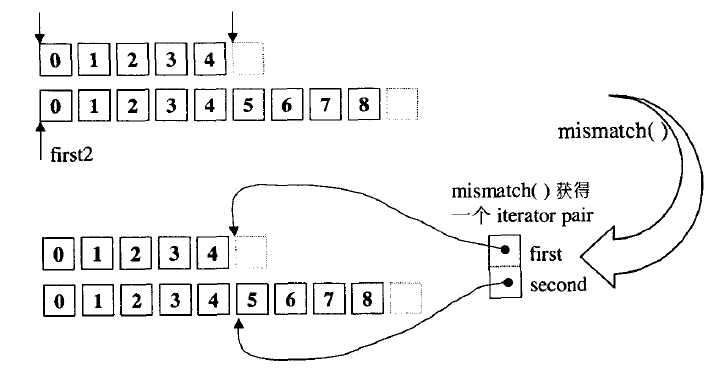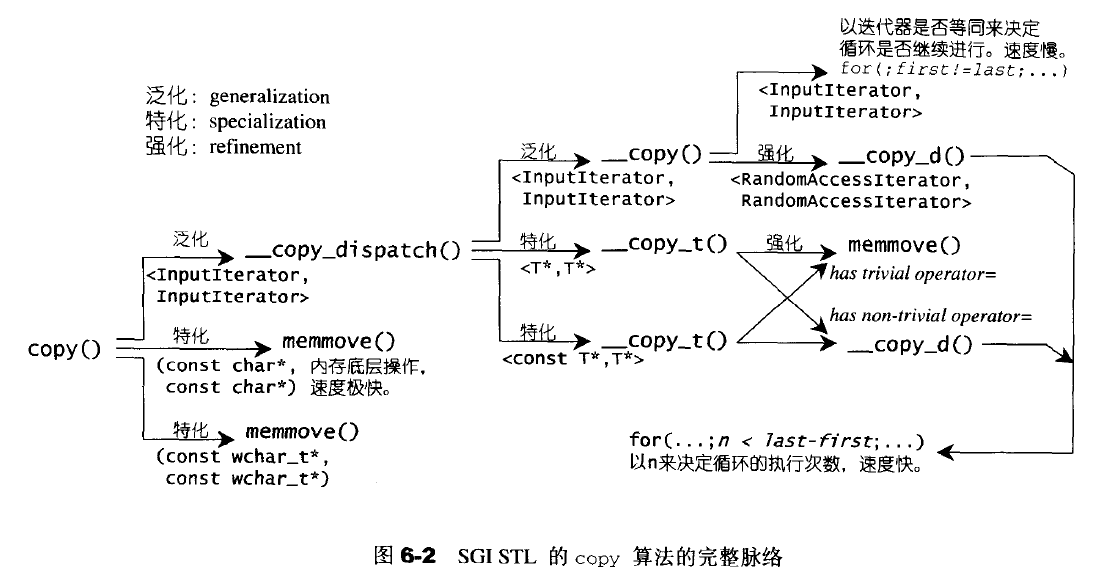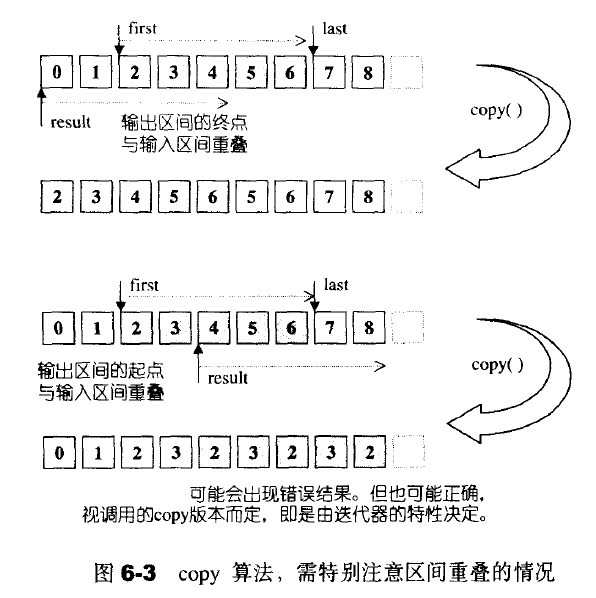euqal
比较两个序列是否相等,相等返回true,不相等返回false
template <class _InputIter1, class _InputIter2>//版本1 inline bool equal(_InputIter1 __first1, _InputIter1 __last1, _InputIter2 __first2) { for ( ; __first1 != __last1; ++__first1, ++__first2)//遍历区间[first,last)元素 if (*__first1 != *__first2)//只有有一个不相等返回false return false; return true; } template <class _InputIter1, class _InputIter2, class _BinaryPredicate>//版本2 inline bool equal(_InputIter1 __first1, _InputIter1 __last1, _InputIter2 __first2, _BinaryPredicate __binary_pred) { for ( ; __first1 != __last1; ++__first1, ++__first2) if (!__binary_pred(*__first1, *__first2))//两个元素执行二元操作符 return false; return true; }
fill
将value值填充整个区间,不能为OutputIterator,因为fill会用到first和last,outputIterator无法做相等的测试
template <class ForwardIterator, class T> void fill( ForwardIterator first, ForwardIterator last,const T& value);
fill_n
会将数值value填充[first,first+n),返回值为first+n,可以用outputIterator
template <class OutputIterator,class size,class T> OutputIterator fill_n( OutputIterator first, OutputIterator last,size n,const T& value);
iter_swap
将两个迭代器所指对象互换
template <class _ForwardIter1, class _ForwardIter2, class _Tp> inline void __iter_swap(_ForwardIter1 __a, _ForwardIter2 __b, _Tp*) { _Tp __tmp = *__a; *__a = *__b; *__b = __tmp; } template <class _ForwardIter1, class _ForwardIter2> inline void iter_swap(_ForwardIter1 __a, _ForwardIter2 __b) { __iter_swap(__a, __b, __VALUE_TYPE(__a)); }
generate
template <class ForwardIterator, class Generator> void generate ( ForwardIterator first, ForwardIterator last, Generator gen ) { while (first != last) { *first = gen(); ++first; } }
generate_n
返回值是first+n,generate和generate_n中的gen会被调用n(或first+n)次,而非只在循环外调用一次,这一点很重要,因为Generate不一定会在每次调用时候都返回相同的结果,因此generate允许从文件读入,取局部状态的值并更改。
template <class OutputIterator, class Size, class Generator> OutputIterator generate_n ( OutputIterator first, Size n,const Generator gen ) { while (n>0) { *first = gen(); ++first; --n; } }
mismatch
与equal类似,但会返回哪里不同,equal(f1,l1,f2)与misatch(f1,l1,f2)。first==l1等价,如果相等,返回两个序列的last

//版本一:调用重载operator==比较元素 template <class InputIterator1,class InputIterator2> pair<InputIterator1,InputIterator2> mismatch(InputIterator1 first1,InputIterator1 last1,InputIterator2 first2) { while (first1 != last1 && *first1 == *first2) { ++first1; ++first2; } return pair<InputIterator1,InputIterator2>(first1, first2);//返回pair类型,first1指向第一个序列不匹配点,first2指向第二个序列不匹配点 } //版本二:调用自己定义的function object来比较 template <class InputIterator1,class InputIterator2,class BinaryPredicate> pair<InputIterator1,InputIterator2> mismatch(InputIterator1 first1,InputIterator1 last1,InputIterator2 first2,BinaryPredicate binary_pred) { while (first1 != last1 && binary_pred(*first1, *first2)) { ++first1; ++first2; return pair<InputIterator1,InputIterator2>(first1, first2); }
lexicographical_compare
返回两个序列的字典排序大小,
- 如果第一序列元素较小返回true,否则返回false
- 到达last1而未到达last2返回true
- 到达last2而未到达last1返回false
- 同时到达last1和last2(所有元素都匹配)返回false
//版本一:调用重载operator==比较元素 template <class InputIterator1,class InputIterator2> bool lexicographical_compare(InputIterator1 first1,InputIterator1 last1,InputIterator2 first2,InputIterator2 last2) { for ( ; first1 != last1 && first2 != last2; ++first1, ++first2)//两组元素一一比较,除非长度不相同 { if (*first1 < *first2) return true; if (*first2 < *first1) return false; } return first1 == last1 && first2 != last2;//第二组还有元素 } //版本二:调用自己定义的function object来比较,inputiterator1 value_type可转化为 BinaryPredicate的第一型别等等 template <class InputIterator1,class InputIterator2,class BinaryPredicate> bool lexicographical_compare(InputIterator1 first1,InputIterator1 last1,InputIterator2 first2,InputIterator2,BinaryPredicate binary_pred) { for ( ; first1 != last1 && first2 != last2; ++first1, ++first2) { if (comp(*first1, *first2)) return true; if (comp(*first2, *first1)) return false; } return first1 == last1 && first2 != last2; }
copy
- 为outputIterator中的元素赋值而不是产生新的元素,所以outputIterator不能是空的
- 如要元素安插序列,使用insert成员函数或使用copy搭配insert_iterator适配器
- 如果输出区间的起头与输入区间重叠,则不能使用copy,如果输出区间的尾端与输入区间重叠,则可以使用;copy_backward的限制与copy相反

与strcpy、memmove的情况类似,具体看下图

在偏特化与全特化中分析过, 最适合的函数会优先调用, 普通函数优先级大于模板函数
template <class InputIterator, class OutputIterator> inline OutputIterator copy(InputIterator first, InputIterator last, OutputIterator result) { return __copy_dispatch<InputIterator,OutputIterator>()(first, last, result); } // 重载 在偏特化与全特化中分析过, 最适合的函数会优先调用, 普通函数优于模板函数 inline char* copy(const char* first, const char* last, char* result) { // 直接调用memmove效率最高 memmove(result, first, last - first); return result + (last - first); } inline wchar_t* copy(const wchar_t* first, const wchar_t* last, wchar_t* result) { // 直接调用memmove效率最高 memmove(result, first, sizeof(wchar_t) * (last - first)); return result + (last - first); } template <class InputIterator, class OutputIterator> struct __copy_dispatch//通过传入参数的迭代器类型再进行优化处理 { OutputIterator operator()(InputIterator first, InputIterator last, OutputIterator result) { // iterator_category获取迭代器类型, 不同迭代器选择不同的重载函数 return __copy(first, last, result, iterator_category(first)); } }; template <class T> struct __copy_dispatch<const T*, T//针对参数是否是原生指针进行泛化 { T* operator()(const T* first, const T* last, T* result) { typedef typename __type_traits<T>::has_trivial_assignment_operator t; return __copy_t(first, last, result, t()); } }; template <class T> struct __copy_dispatch<T*, T*> { T* operator()(T* first, T* last, T* result) { typedef typename __type_traits<T>::has_trivial_assignment_operator t; return __copy_t(first, last, result, t()); } }; template <class InputIterator, class OutputIterator> inline OutputIterator __copy(InputIterator first, InputIterator last,OutputIterator result, input_iterator_tag) { // 通过迭代器将一个元素一个元素的复制 for ( ; first != last; ++result, ++first) *result = *first; return result; } template <class RandomAccessIterator, class OutputIterator> inline OutputIterator __copy(RandomAccessIterator first, RandomAccessIterator last, OutputIterator result, random_access_iterator_tag) { return __copy_d(first, last, result, distance_type(first)); } template <class RandomAccessIterator, class OutputIterator, class Distance> //优化处理 template <class T> inline T* __copy_t(const T* first, const T* last, T* result, __false_type) { return __copy_d(first, last, result, (ptrdiff_t*) 0); } //优化处理 template <class T> inline T* __copy_t(const T* first, const T* last, T* result, __true_type) { memmove(result, first, sizeof(T) * (last - first)); return result + (last - first); } inline OutputIterator __copy_d(RandomAccessIterator first, RandomAccessIterator last,OutputIterator result, Distance*) { // 通过迭代器之间的元素个数将一个元素一个元素的复制 for (Distance n = last - first; n > 0; --n, ++result, ++first) *result = *first; return result; }
copy_backward
从结果集的尾端到头端复制元素,返回result-(last-first)
template <class BidirectionalIterator1,class BidirectionalIterator2> OutputeIterator copy(BidirectionalIterator1 first,BidirectionalIterator1 last,BidirectionalIterator2 result);